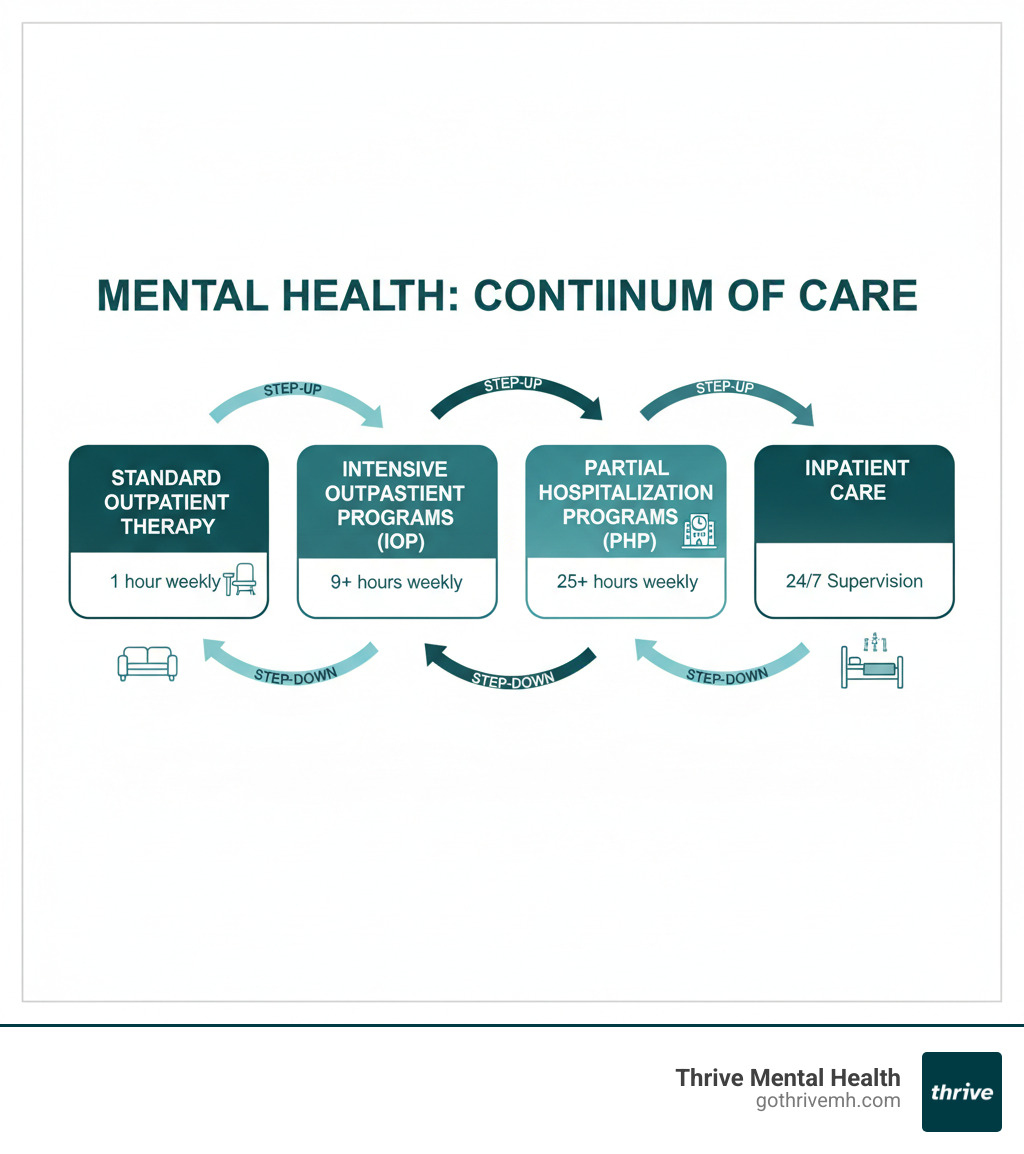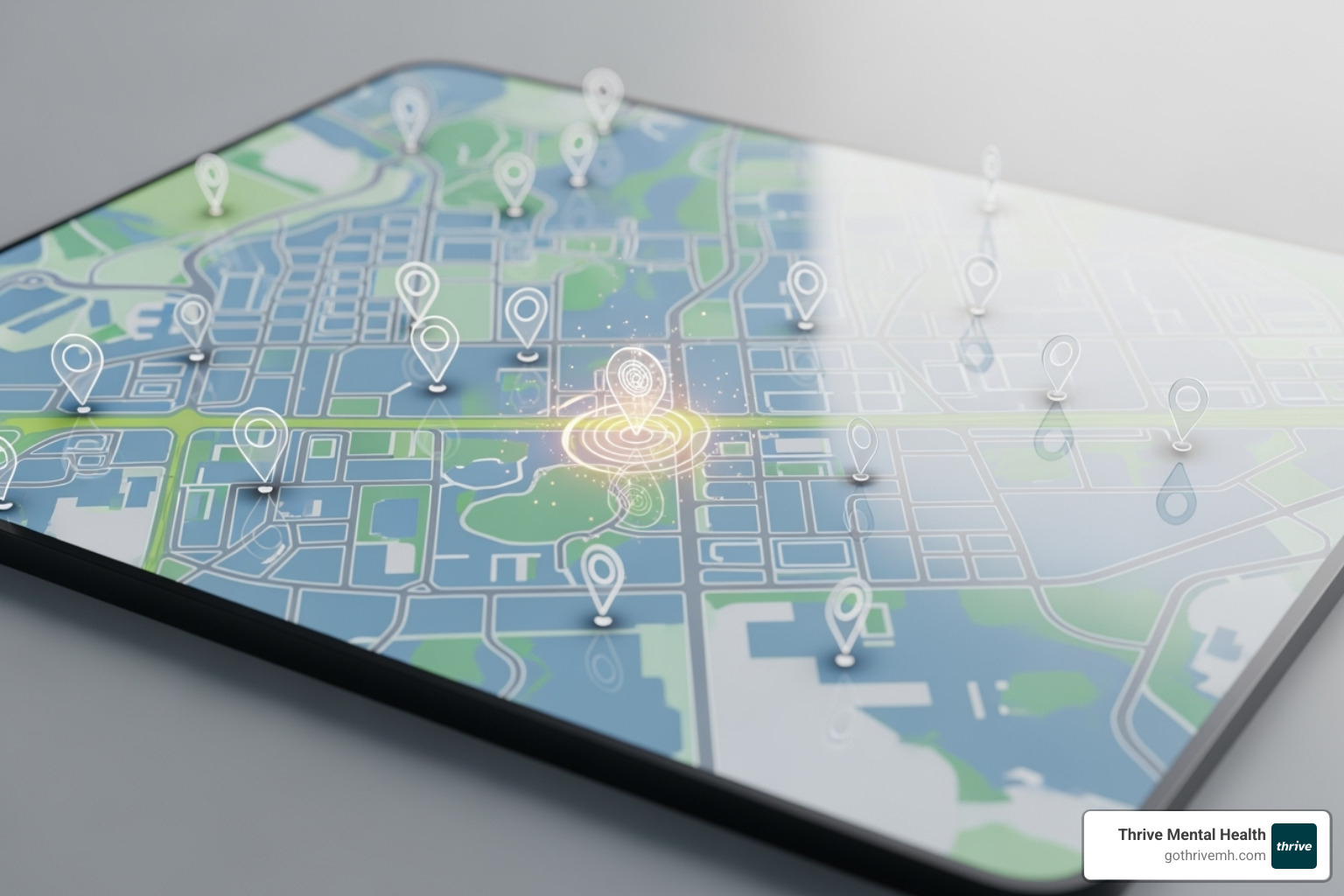IOP Programs Nearby: Because Mental Health Shouldn’t Require a Road Trip

IOPs Near Me: 90% Success for Healing
Why Finding Quality Mental Health Care Shouldn’t Be a Geographic Lottery
When you’re searching for iops near me in Florida, you’re likely at a point where weekly therapy isn’t enough. The good news is you have more options than ever, both locally and virtually, across the Sunshine State.
Quick Answer for “IOPs Near Me”:
- What is it: An Intensive Outpatient Program offering 9+ hours of therapy weekly while you live at home.
- Who needs it: Individuals needing more support than weekly therapy but not 24/7 inpatient care.
- How to find: Search insurance directories, ask your doctor, or explore virtual programs.
- Time commitment: Usually 3 sessions per week, 3 hours each.
- Duration: Typically 9-12 weeks (average 18 days of active treatment).
Finding the right Intensive Outpatient Program in Florida shouldn’t mean driving for hours in I-4 traffic or settling for the closest option. Whether you’re stepping down from inpatient care or up from standard therapy, an IOP provides structured support without disrupting your entire life.
Data shows that 90% of clients experience reduced symptoms with the right IOP match. And “near me” no longer just means within driving distance. Virtual IOPs are breaking down geographic barriers, giving Floridians from Key West to the Panhandle access to specialized care regardless of their zip code.
IOPs work because they hit the sweet spot: they’re more intensive than a weekly therapy appointment but flexible enough to accommodate your job, school, or family commitments. You can expect about 9 hours of treatment per week, typically spread across 3 days.
I’m Anna Green, LMHC, LPC, Chief Clinical Officer and founder of Thrive. I’ve helped develop virtual-first IOPs that earned The Joint Commission’s telehealth accreditation. I’ve seen how location—whether in a bustling city like Miami or a quieter part of the state—often prevents people from getting the specialized care they need. Our programs are designed to make high-quality mental health care accessible and effective for all residents of Florida.

What is an Intensive Outpatient Program (IOP)?
When searching for iops near me, you’re looking for a treatment that bridges the gap between weekly therapy and full-time residential care. An Intensive Outpatient Program (IOP) provides structured mental health treatment, allowing you to live at home while receiving the intensive support you need.
Think of an IOP as a safety net with built-in flexibility. You get far more support than a weekly appointment without the 24/7 commitment of inpatient care. It’s designed for individuals who need more than standard therapy but don’t require round-the-clock medical supervision.
IOPs typically involve 9 hours of treatment per week, often as three 3-hour sessions. This structure is deep enough for meaningful work yet manageable alongside your job, school, or family life. An IOP provides a crucial middle ground, whether you’re stepping up from weekly therapy or stepping down from inpatient care.
You’ll engage in group therapy, individual sessions, and skills training while maintaining your daily routine. It’s intensive enough for real change and flexible enough for your schedule, with many programs offering morning, afternoon, and evening options so you can get better without putting your life on hold.
For a deeper dive into what an IOP entails, explore our Comprehensive Guide to Intensive Outpatient Programs.
IOP vs. Other Levels of Care: Finding Your Fit
When searching for iops near me, it’s helpful to understand where they fit within the spectrum of mental health care. Think of treatment as a ladder: you need the right rung for your specific needs—not too high and not too low.
IOPs hit that sweet spot. You get significantly more support than weekly therapy (9-15 hours vs. one) while maintaining the freedom to live at home, work, and stay connected to your support system.
Here’s how the different levels of care compare:
| Level of Care | Time Commitment | Living Arrangement | Level of Supervision | Best For |
|---|---|---|---|---|
| Inpatient/Residential | 24/7 | Live at facility | Constant (24/7 medical & therapeutic) | Severe symptoms, crisis stabilization, unsafe at home, initial detox/stabilization |
| Partial Hospitalization Program (PHP) | 5-7 days/week, 4-6 hours/day | Live at home (or sober living) | High (structured daily treatment) | Transition from inpatient, significant functional impairment, needs daily structure but not 24/7 supervision |
| Intensive Outpatient Program (IOP) | 3-5 days/week, 3 hours/session (9-15 hours/week) | Live at home (or sober living) | Moderate (structured weekly treatment) | Stepping down from PHP/inpatient, stepping up from standard outpatient, needs significant support while maintaining daily life, co-occurring disorders |
| Standard Outpatient | 1-2 hours/week | Live at home | Minimal (weekly or bi-weekly sessions) | Mild to moderate symptoms, ongoing maintenance, aftercare from higher levels of care, stable functioning |
The key is flexibility without sacrificing effectiveness. An IOP helps you transition from inpatient care or provides more structure when weekly therapy isn’t enough. IOPs work because they integrate into your life. You can still work, care for family, or attend school while adding the focused treatment hours that drive change.
For a deeper understanding of how PHP and IOP programs compare, check out our detailed guide on PHP vs. IOP: Understanding the Differences.
Is an IOP Right for You? Key Signs to Look For

Crisis Disclaimer: If you or someone you know is in crisis or struggling with thoughts of self-harm, please call or text 988 to reach the Suicide & Crisis Lifeline. You are not alone, and help is available 24/7.
When you’re searching for iops near me, you likely recognize that weekly therapy isn’t providing enough support. This doesn’t mean therapy is failing; it means you may need a different level of care. Key signs an IOP could be right for you include:
- Worsening symptoms of depression or anxiety despite regular therapy. Our data shows 90% of clients report improvements in symptoms of both depression and anxiety.
- Difficulty functioning at work or home. If mental health challenges are impacting your responsibilities, it’s a sign you need more intensive support.
- Needing structure after a crisis or mental health emergency. An IOP provides crucial scaffolding as you rebuild stability.
- Stepping down from residential care. An IOP acts as an important bridge, offering intensive support as you readjust to daily life.
For more insight, check out our guide on Understanding Early Warning Signs and Symptoms.
Who is a Good Candidate for an IOP?
The ideal IOP candidate has a stable living environment and a strong support system (family, friends, or even one key person). You must be motivated for recovery and not require 24/7 medical supervision. If you are a danger to yourself or others, a higher level of care is necessary first. Our programs are also designed for those managing co-occurring disorders, such as depression and substance use, through integrated approaches like our Dual Diagnosis program.
What if I’m in Crisis?
If you’re in crisis, call or text 988 right now. You are not alone.
Crisis situations need immediate attention. If you’re having thoughts of suicide, experiencing severe panic attacks, or feel you might harm yourself or others, get immediate help through our 24 Hour Mental Health Helpline. Once stabilized, an IOP can be an excellent next step, but your immediate safety comes first.
How to Find Quality IOPs in Florida

Finding the right IOP in Florida when you’re struggling can feel daunting, but your options are broader than ever. Your search for iops near me now includes high-quality virtual programs that serve the entire state. Start by asking your doctor for recommendations and checking your insurance provider’s directory for in-network options.
What to Look for in a Quality Program
Not all IOPs are equal. Avoid programs promising quick fixes and look for these quality indicators:
- Accreditation: Joint Commission Accreditation: Behavioral Health signifies adherence to high national standards for safety and quality.
- Licensed Therapists: Ensure your care is led by state-licensed professionals.
- Evidence-Based Therapies: The program should be built on proven treatments like CBT and DBT.
- Individualized Plans: Your treatment plan should be custom to your unique needs.
- Family Involvement: Options for family participation can significantly improve outcomes.
- Aftercare Support: Quality programs prepare you for long-term success after treatment ends.
In-Person vs. Virtual IOPs
In-person IOPs offer face-to-face interaction in a dedicated healing space, but they are limited by geography and require commuting.
Virtual IOPs provide game-changing flexibility and access for residents across Florida. We serve clients throughout the state, from Jacksonville to Miami and Tampa to Orlando, connecting you with specialists without the commute. With morning, afternoon, and evening sessions, treatment fits your schedule. You gain access to specialized care and learn coping skills in your own environment—whether that’s a South Florida apartment or a home in the Panhandle—making them more transferable to daily life. All you need is a reliable internet connection and a private space.
Learn more about The Top Advantages of Choosing Virtual IOP for Your Mental Health Needs.
Paying for IOP: Insurance & Costs
Financial stress shouldn’t add to your struggles. Most major insurance providers in Florida, including Cigna, Aetna, Florida Blue, and UnitedHealthcare, cover IOPs. Your out-of-pocket cost depends on your plan’s deductible, copay, and coinsurance.
Medicaid coverage is also available for eligible Florida residents. Mental health benefits have expanded, so don’t assume you’re not covered.
Verifying your benefits is the most important first step. Our obligation-free process takes just two minutes and clarifies your costs upfront. Explore your options for Virtual IOP Insurance so there are no financial surprises.
What to Expect: A Look Inside a Typical IOP Program

It’s normal to feel nervous before your first IOP session, but programs are designed to be supportive from day one. You’ll join a community of peers guided by experienced professionals. The results are powerful: 90% of our clients report significant improvement in depression and anxiety symptoms, and 89% see improvements in self-harm behaviors.
Typical Services and Therapies
Your IOP will be built around a core of evidence-based treatments:
- Group Therapy: About 9 hours per week, this is where you connect with peers who understand your struggles.
- Individual Therapy: A weekly session with your dedicated therapist to work on personal goals.
- Family Therapy: Weekly sessions are available to help your support system learn how to help you best.
- Medication Management: Optional Medication Management Online services are integrated into your care plan.
- Skills-Based Training: You’ll learn practical tools through Cognitive Behavioral Therapy (CBT) and Dialectical Behavior Therapy (DBT) to manage thoughts and emotions. Some programs also offer creative outlets like Art Therapy.
A Typical Week and Program Length
A typical week involves 9-12 hours of therapy. With morning, afternoon, and evening options, you can attend treatment discreetly. Most clients complete an IOP in 9-12 weeks (averaging 18 days of active participation), but the length is flexible and based on your progress toward your goals. For more details, see our IOP Program Requirements.
Community and Peer Support
The community aspect of IOP is often the most treasured part. Many programs use 12-Step facilitation to connect you with groups like Alcoholics Anonymous (AA) and Narcotics Anonymous (NA). This helps you build a sober support network that will last long after treatment ends.
Frequently Asked Questions about Intensive Outpatient Programs
Choosing the right mental health care is a big decision. Here are answers to common questions people have when searching for iops near me.
How do I know if I need an IOP?
You might need an IOP if weekly therapy isn’t enough, your symptoms are interfering with daily life, or you’re transitioning from a higher level of care (like inpatient or PHP). The best way to know for sure is through a clinical assessment with a mental health professional, who can recommend the right level of care for your needs.
Can I still work or go to school during an IOP?
Yes. This is a key advantage of IOPs. They are designed for flexibility, allowing you to maintain your work, school, and family commitments. With morning, afternoon, and evening sessions available, you can integrate treatment into your existing schedule without putting your life on hold.
What is the success rate for IOPs?
Success rates are high for those who complete the program. Our data shows that up to 90% of clients report reduced symptoms of depression and anxiety and improved overall functioning. Success depends on completing the program and actively engaging in the therapeutic process.
How much does an IOP cost with insurance?
Most major insurance providers in Florida cover IOPs, including plans from Florida Blue, Cigna, Aetna, and UnitedHealthcare. Your out-of-pocket cost will depend on your specific plan’s deductible, copay, and coinsurance. The best first step is to verify your insurance coverage to get a clear, upfront estimate. We provide this service obligation-free so there are no financial surprises.
Conclusion: Take the Next Step Towards Healing
Your search for iops near me in Florida ends here. You’ve recognized that you need and deserve more support, and an Intensive Outpatient Program offers the perfect balance of structure and flexibility.
With an IOP, you get structured, evidence-based care with proven results (90% of clients improve) while living at home and maintaining your daily life. Geography no longer limits your healing—our virtual IOP gives you access to specialized care from anywhere in Florida.
With morning, afternoon, and evening options, you can fit intensive healing into your life without pausing your career, education, or family. You won’t be alone. Our comprehensive approach combines group, individual, and family therapy with skills-based training (CBT, DBT) and peer support.
The right support is ready when you are.
Ready for support? Thrive offers virtual IOP/PHP programs to all Florida residents, with evening options available. Verify your insurance in 2 minutes (no obligation) → Start benefits check or call our Florida-based team at 561-203-6085. If you’re in crisis, call/text 988.